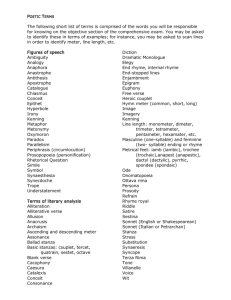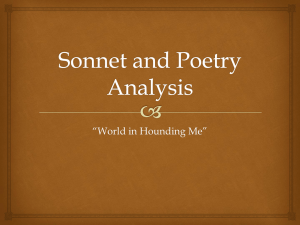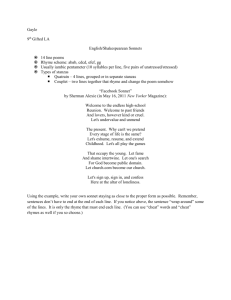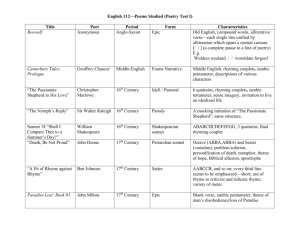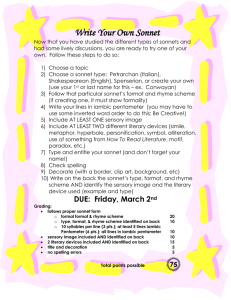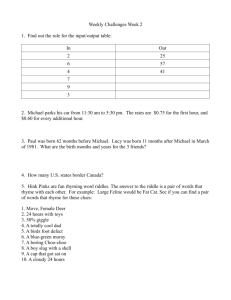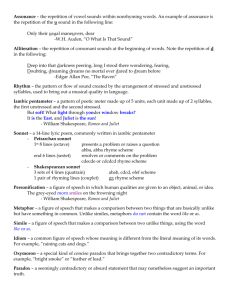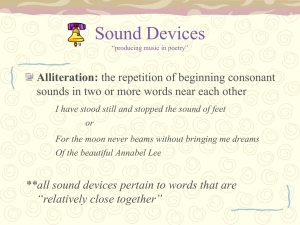Reading Poetry
advertisement
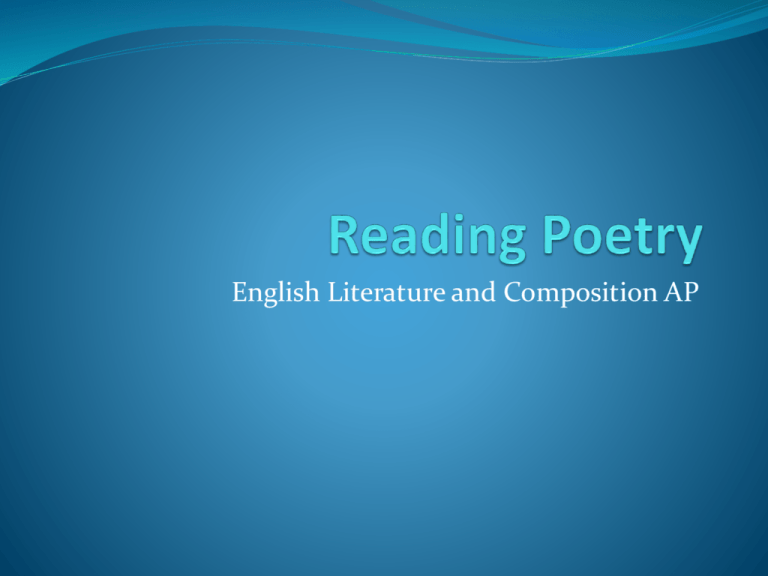
English Literature and Composition AP Elements of Poetic Style Diction: selection of words Syntax: order of words Imagery: details of sight, sound, taste, smell and touch Figurative Language: non literal ways of expressing one thing in terms of another Symbolism Metaphor Sound Effects Rhyme Assonance Consonance Alliteration Meter Structure Parts of a Poem Stanza: any unit of recurring meter and rhyme – or variations of them – used in an established pattern of repetition an separation in a single poem. Lines can be the same length or different lengths. Meter: Greek word for “measure.” Lines of a poem. Three meters most commonly used in English Accentual meter (accents are counted) Syllabic meter (syllables are counted) Accentual-Syllabic meter (both are counted) Accentual-Syllabic Meter Dominates English poetry. Is measured in “feet” Feet: patterns of stressed and unstressed syllables. Where the force and power of meter occurs. Common “Feet” Iamb: the most common foot, a short stress followed by a long one. About. A (short) Bout (long) Trochee: less common, long stress followed by a short one. This is. This (long) is (short) Dactyl: a long stress followed by two short ones. Happily. Hap (long) i (short) ly (short) Anapest: two short stresses followed by a long one In a tree. In (short) a (short) tree (long) Spondee: two long stresses Humdrum. Hum (long) drum (long) Check For Understanding Write an example of an iamb. What is a pentameter? What is a dactylic tetrameter? Write an example of a spondee. Verse Forms Verse forms do not define poetic form: they simply express it. Variations in poems do not make them abstract, but human. Forms can express feeling as well as historical context. Villanelle Villanelle: 19 lines, 5 stanzas. Rhyme scheme is aba. Alternates in repeating the first and last lines of the first stanza at the end of every following stanza. They then repeat together in the last stanza. Absence of narrative possibility. Mood, emotion, and memory Does not progress forward. Under the Hill Daryl Hine The gates fly open with a pretty sound, No offer opposition to the knight. A sensual world, remote, extinct is found. In Venus’ clutches, under Venus’ mound, He whiles away the long venereal night. A sensual world, remote, extinct, is found. In walls that like luxurious thorns surround The exquisite lewdness of the sybarite, The gates fly open with a pretty sound. The single function on which Venus frowned Was birth; and, maybe life has proved her right. The gates fly open with a pretty sound. A sensual world, remote, extinct, is found. Where venery goes hunting like a hound, And all the many mouths of pleasure bite, A sensual world, remote, extinct, is found. A passionate pilgrim stayed beneath the ground Meets only death, until, to his delight, The gates fly open with a pretty sound Sestina Sestina: 39 lines, 6 stanzas of 6 lines. The same six end words must repeat but in changing order. Does not rhyme. Purpose was to entertain. Fashion forward. Troubadours: court poets. Ye Wasteful woodes, bear witness to my woe The Shepheardes Calendar(August, lines 151-162) Edmund Spencer Ye wasteful woodes bear witness of my woe, Wherein my plaints did oftentimes resound: Ye carelesse byrds are privie to my cries, Which in your songs were wont to make a part: Thou pleasaunt spring hast luld me oft to sleep, Whose streames my tricklinge tears did oft augment. Resort of people oft my greefs augment, The walled townes do worke my greater woe: The forest wide is fitter to resound The hollow echo of my cries, I hate the house, since thence my love did part, Whose watleful want debarres mine eyes from sleep. Pantoum Pantoum: Unspecified length, first and last line must be the same, second and fourth lines of the first quatrain become the first and third lines of the next and so on, rhyme scheme is abab, final quatrain changes this pattern. evokes a past time. Not a straight forward narrative. Grandmothers’s Song Nellie Wong Grandmothers sing their song Blinded by the suns’ rays Grandchildren for whom they long For pomelo-golden days To dance in fields of mud Or peel shrimp for pennies a day Proud as if of royal blood Coins and jade to put away Blinded by the sun’s rays Gold bracelets, opal rings For pomelo-golden days Tiny fingers, ancient things Or peel shrimp for pennies a day Seaweed washes up the shore Coins and jade to put away A camphor chest is home no more Gold bracelets, opal rings Sprinkled with Peking dust Tiny fingers, ancient things So young they’ll never rust Seaweed washes up the shore Bound feet struggle to loosen free A camphor chest is home no more A foreign tongue is learned at three Sprinkled with Peking dust To dance in fields of mud So young they’ll never rust Proud as if of royal blood Bound feet struggle to loosen free Grandchildren for whom they long A foreign tongue is learned at three Grandmothers sing their song Sonnet Sonnet: 14 lines, usually iambic Two forms of sonnet Petrarchan: Italian, octave 8 lines and a sestet of 6, rhyme scheme of the octave is ababcdcd, of the sestet cdecde. Shakespearean: English, rhyme scheme is. ababcdcdefefgg. No octave/sestet structure to it. Shall I compare thee to a summer’s day? Sonnet 18 William Shakespeare Shall I compare the to summer’s day? Thou art more lovely and more temperate: Rough winds do shake the darling buds of May, And summer’s lease hath too short a date; Sometimes too hot the eye of heaven shines, And often is his gold complexion dimmed; And very fair from fair sometime declines, By chance or nature’s changing course untrimmed; But thy eternal summer shall not fade, Nor lose possession of that fair thou ow’st; Nor shall breath brag thou wand’rest in his shade, When in eternal lines to Time thou gow’st; So long as men can breath, or eyes can see, So long lives this, and gives life to thee. Ballad Ballad: usually 4 line stanzas, alternates between iambic tetrameter (lines 1 &3) and iambic trimeter (lines 2&4), a short narrative, rhyme scheme is abab or abcb. Always stories of lost love, supernatural happenings, or recent events. Uses local speech. Real Cool Thee Pool Players Gwendolyn Brooks We real cool. We Left school. We Lurk late. We Strike straight. We Sing sin. We Thin gin. We Jazz June. We Die soon. Blank Verse Blank Verse: iambic line with ten stresses and five beats, unrhymed. Associated with dramatic speech and epic poetry. Often identified as the poetic form closest to human speech. From The Prelude (Book Thirteenth, 1805, 10-25) William Wordsworth It was a summer’s night, a close warm night, Wan, dull, and glaring, with a dripping mist Low-hung and thick that covered all the sky, Half threatening storm and rain; but on we went Unchecked, being full of heart and having faith In our tried pilot. Little could we see, Hemmed round on every side with fog and damp, An, after ordinary travelers' chat With our conductor, silently we sunk Each into commerce with his private thoughts. Was nothing either seen or heard the while Which took me from my musings, save that once The shepherd's cur did to his own great joy Unearth the hedgehog in the mountain-crags, Round which he made a barking turbulent. Heroic Couplet Heroic Couplet: A rhyming pair of lines, usually iambic pentameter or tetrameter, rhyme scheme is aabbcc. Involved high subject matter. Was often the form Greek and Latin epic poetry was translated into. From An Essay on Criticism (lines 201-214) Alexander Pope Of all the causes which conspire to blind Man’s erring judgment, and misguide the mind, What the weak head with strongest bias rules, Is pride, the never-failing voice of fools. Whatever Nature has in worth denied, She gives in large recruits of needful pride; For as in bodies, thus in souls, we find What wants in blood and spirits swelled with wind: Pride, where wit fails, steps in to our defense, And fills up all the mighty void of sense. If once right reason drives that cloud away, Truth breaks upon us with resistless day. Trust not yourself: but your defects to know, Make use of every friend – and every foe. Identify the type of poem, meter, any figurative language, and historical context. Analyze the content. Bright Star John Keats Bright star, would I were steadfast as thou art – Not in lone splendor hung aloft in the night And watching, with eternal lids apart, Like nature’s patient, sleepless Ermite, The moving waters at their priestlike task Of pure ablution round earth’s human shores, Or gazing on the new soft fallen mask Of snow upon the mountains and the moors – No – yet still steadfast, still unchangeable, Pillowed upon my fair love’s ripening breast, To feel forever its soft fall and swell, Awake forever in sweet unrest, Still, still to hear her tender-taken breath, And so live ever – or else swoon to death.
